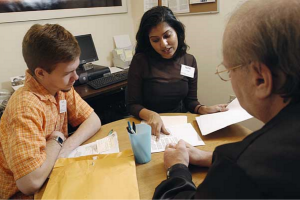Law school fills need for free legal services
by Gretchen Christensen
Year-round law clinics at the University of Wisconsin-Madison allow law school students to serve Madison residents in need of legal assistance.
These free clinics offer a variety of services and specialties to anyone in Madison, especially those who cannot afford legal counsel or are underrepresented. However, the students at these clinics cannot provide legal advice or advocacy in or out of court, since they are not qualified to do so.
Though the specific purpose of each clinic varies, most of them aim to help people understand what to expect from legal proceedings, how to prepare for and act during a court hearing and how to organize their testimony. They also help people fill out legal forms and documents accurately and completely.
The Remington Center, which houses all of the clinics, began 50 years ago. All students are supervised by licensed attorneys, and the clinics run for a full year, beginning in the summer and ending after the spring semester.
Olwen Jaffe, a second-year law student, said the school is known for having impressive clinical programs. Jaffe is a member of the Family Court Clinic.
The FCC offers workshops in areas such as the divorce process; child welfare, support, and paternity issues; and obtaining restraining orders.
The Neighborhood Law Clinic, which is also part of the Remington Center, offers help to people who haven’t been compensated properly for their work, such as those who haven’t been paid at least minimum wage; people who are taking legal action against landlords, and people who aren’t receiving their Social Security or Section 8 housing vouchers.
Sophie Crispin is a second-year law student, and a member of the NLC. Crispin said that wage dispute cases are unfortunately very common in Wisconsin, especially for workers who get paid on commission because their boss can say that their work wasn’t satisfactory. These cases are also very common for undocumented workers–or even for low-income Spanish speakers that employers assume are undocumented–as their employers know they have less access to legal recourse than other employees.
Many of the clinics’ cases are ongoing, and therefore some aren’t closed before the students finish the clinic. For this reason, it isn’t unusual for a case to pass between students.
“I think maybe this harms the client, because they get new students that are working on them, and then you don’t have that continuity. But because it’s an academic program, it’s hard to see how else they would do it. There’s not the staff in the clinics to (close all of the cases in a year and) give everyone new cases every time they start,”Jaffe said.
Although there isn’t an income limit for a person to attend the clinics, many of their clients are low-income individuals. While public defenders help people who are accused of criminal activity for little or no cost, there is no one in the legal system that helps other clients the same way.
“We usually try to help people who couldn’t be helped otherwise, ” Crispin said.
 The Arc: Visions of justice
The Arc: Visions of justice
